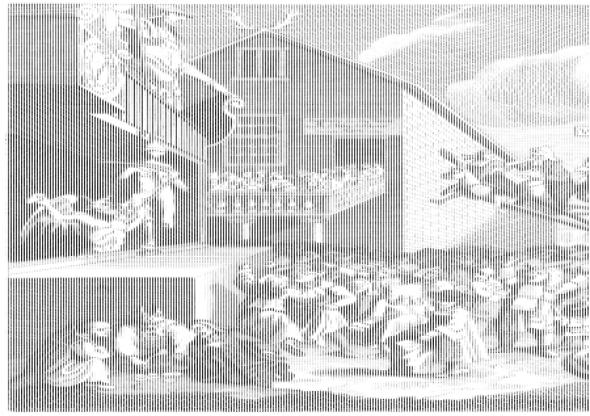Waiting For the End of the World
Would a financial crisis mean recession, depression or revolution? And haven’t we been waiting a long time for this liberating, or devastating, catastrophe? Jeff Strahl surveys the prophets and naysayers and gives his own take on ‘a global crisis of unprecedented proportions’
Expectation of a global economic collapse is a lot like waiting for Godot. It even features a ‘first coming’, namely the 1929 crash and subsequent global depression. Such a development has been described innumerable times in the last century. But the discussion has become very lively in the last few months, due to factors such as the crisis in the sub-prime housing loans market, increasing attention to ballooning debt levels of all sorts, and rising global trade tensions.
Mainstream media discussion has of course largely discounted the very possibility of a global economic collapse ever since... the last collapse. The argument usually revolved around the assertion that regulatory measures adopted during and after the 1930s make such a collapse pretty impossible, including the preclusion of disastrous trade conflicts due to the world economic structure becoming more and more integrated, and the stakes all national capitals have in making sure that cooperation continues. This consensus even includes much of what passes for left media, e.g., Left Business Observer, whose editor Doug Henwood is regularly called upon to provide commentary on ‘progressive’ media outlets such as Pacifica Radio, during which he downplays any possibility of a catastrophic crisis.[1] Henwood and his cohorts have of course generally come to adopt neo-Keynesian perspectives, even when they still claim an affinity with Marxist analysis, describe problems as basically the results of corporate greed and incompetent right-wing policy makers, and prescribe little more than traditional liberal palliatives such as a hike in the minimum wage and higher taxes on the rich.
Outside this consensus, one sees analysts such as James Petras, who pens articles on the state of global capital such as ‘Crisis of US Capitalism or the Crisis of the US Wage and Salaried Worker?’[2] He contends that, from the perspective of capital, everything is just fine. Mega-corporations are making money, there is no profitability crisis, no crisis of capital whatsoever, and exploitation is going on as normal.
Further along, we have people with occasionally vaguely left politics who do see a mounting problem with the global economy in particular due to the debt situation, who predict that a major crisis is looming, but eschew the notion that such a crisis would afflict the capitalist system as a whole. Rather it would be confined to the US, or only affect the set up of the system as it is right now, i.e., under US control and domination. Mike Whitney has written a series of articles on the mounting liquidity crisis, including one in which he asserts that what’s needed is a new compact of cooperation between labour and capital.[3] Henry Liu also sees the crisis as one which will primarily impact the US, leading to a new era of supremacy in the world market for what he calls China’s ‘market socialism’.[4] Former US Treasury Department official (in the Carter administration) Richard Cook espouses ‘reforms’ such as social credit, an idea discredited back in the 1930s (when it was popular with Fascists), but who remembers?[5]
Image: Pope-ass, Medieval harbinger of the end of the world. Socialism or bestiary?
Then we have those who see a generalised global collapse as becoming increasingly likely, and predict that its onset will pretty automatically produce a situation which will lead to a revolution. These include ‘Anticipation Laboratory’ Leap2020 and various ultra-left sects.[6] The idea is that mass degradation will push people to realise that the capitalist system itself is at fault, that it is unsustainable, and that human happiness, indeed our very survival, will require a total transformation of the system. This is held in spite of the failure of past episodes of mass crisis, including the ’30s, to actually lead to such a turn of events.
The nature of the crisis is such that reformist measures, if ever they could work, no longer are able to do so. One needs to remember that Marx’s analysis of capital was in its rawest, most fundamental form, based upon an admittedly fictitious (albeit valid in essential ways) situation of a single global capital facing the entire world’s population of wage workers. Capital survives by forcing that population to work a full day while only a decreasing fraction of that day is equivalent to the socially necessary labour time required to produce what it takes for that population to survive as wage workers under the given conditions. All labour performed in addition to socially necessary labour time (i.e. the time it takes for the worker to produce enough to meet her own needs) is surplus value, the source of all profits. Hence, surplus value is produced under a global process, while the actually-existing individual capitals (i.e. companies and businesses) appropriate shares of this surplus via market interactions which have less and less to do with the actual portions of the surplus that they produce, if indeed they produce any. All crises of capital, including the fundamental one of the tendency of the rate of profit to fall, are rooted in this dynamic, whose tendency is the expulsion of living labour, the only source of surplus value.[7]
However, this is generally not visible if one were to look at market data, as market interactions are reflective only of prices. Prices of commodities are at best only an approximation of their values, the socially necessary labour time expended in their production. Increasingly, prices diverge from values, especially as more and more activity takes place in the realm of circulation, as opposed to production. And financial speculation increases the abstraction from values ever more. In an era of derivatives, bets are made not on industries but on instruments of... financial speculation, e.g. stocks. Reckoning comes only when the imbalances become totally unsupportable, much as a structure made up of cards may become unstable long before that last card causes it to collapse. But global economic collapse is far more likely to be experienced as sinking into a patch of quicksand than as going over a cliff.
Mechanisms set up after WWII with the intention of regulating domestic economic systems as well as the world market are unable to deal with capital’s fundamental contradiction, not even remotely acknowledged by mainstream economists, or even many ‘left’ ones. All they have managed to do is push the contradictions to the side, to defer the crisis, at the cost of making the contradictions ever deeper, as for example in building a debt bubble that is far in excess of anything else ever experienced. Increasingly, counter-measures being undertaken only make matters worse, or ameliorate one symptom by making others even more accentuated.
Furthermore, this is coming on top of a crisis in the real physical world which serves as a setting for capitalist production. This comes in the form of degradation of the environment, e.g. global warming, contamination by toxic chemicals of land, air and sea, species die-offs. And it comes in the form of resource depletion, be it of the soil, or supplies of raw materials vital for production – most importantly that of oil and natural gas, which provide the cheap energy that has made the global production system viable in the first place.
A global crisis of unprecedented proportions is thus increasingly likely, I’d say impossible to avoid. But people committed to a fundamental transformation of society cannot simply sit back and let it happen and hope all turns out alright. Given the past, there is a good chance (in fact, it is more likely) that those whose material conditions are driven way down by developments will turn to some charismatic figure who promises deliverance by some sort of reformist programme, or by waging war to secure resources for ‘our nation’, or a combination of the two.
This is, of course, not the ’30s. On one hand, people are now even less connected to the land than they were then, more detached from any sort of culture which consists of something beyond the consumption of goods and images, and more cynical about the possibility of radical social change; ‘the 1960s’ or the Soviet experience supposedly show that striving for this brings chaos or something worse than what one started with. On the other hand there is less room for any Keynesian or other reformist measures to provide even temporary relief.
Why not? Massive state spending is not a viable option when debts are already maxed out. And a resort to global war, which is what ultimately ended the 1930s depression, is problematic in an era in which such warfare could easily result in the extinction of human life, or at the very least its descent into barbarism. When it really comes down to it, it’s up to us as a species as to how we get out of this alive, and we have no time to lose, the hour’s getting late.
FOOTNOTES
[1] http://www.leftbusinessobserver.com
[2] http://www.globalresearch.ca/index.php?context=va&...
[3] http://www.dissidentvoice.org/2007/05/swan-song-fo...
[4] http://www.atimes.com/atimes/China_Business/IE23Cb...
[5] http://www.globalresearch.ca/index.php?context=va&...
[7] Living labour is Marx’s term for human labour that creates both new use values and new exchange value. Living labour valorises – that is, increases the value of – invested capital.
Jeff Strahl is a long-time San Francisco Bay Area activist
Mute Books Orders
For Mute Books distribution contact Anagram Books
contact@anagrambooks.com
For online purchases visit anagrambooks.com









